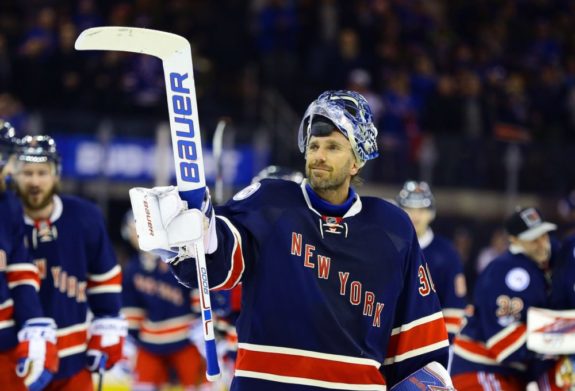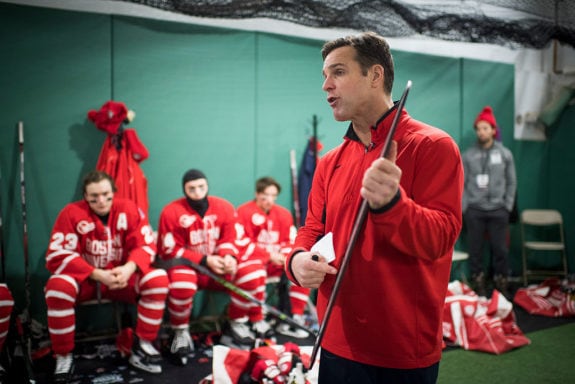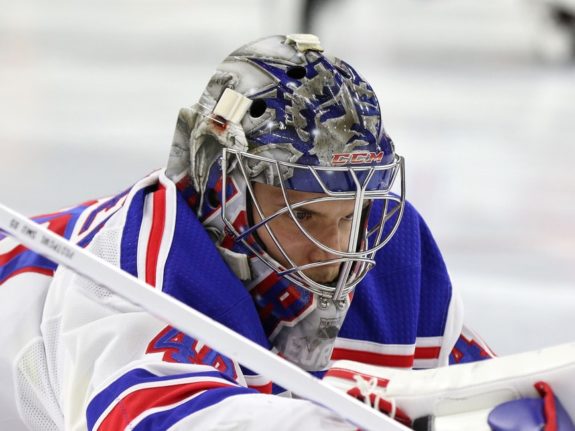The best goaltender the New York Rangers have ever had doesn’t want to play anywhere but Broadway – even with some potential pain looming at Madison Square Garden.
When his Blueshirts finally decided to run up the white flag last season after a decade of playoff and Stanley Cup contention, Henrik Lundqvist professed his desire to be a part of the club’s rebuild – a process which has chugged along since with the trading of veterans for youth and draft picks, and the hiring of a rookie coaching staff charged with player development.
Lundqvist embraced the strategy of the Rangers starting over after management correctly assessed that the core that carried the team to the verge of the Cup had gone as far as it could go. Yet, his early February comments regarding what was then only a potential selloff of assets certainly seemed to come across as at least somewhat conflicted.
“The competitor in me wants us to have the best team possible right here and now. I’m not hoping we have a contending team in two or three years,” Lundqvist said. “But at the same time, even though it’s hard to say because it kind of goes against myself, I feel so much for this organization, that whatever path they take, I’m in. I made a commitment to this organization a few years back. It was a big decision in my career. I hope they have the same commitment to me. I guess it would really be up to them if they have another idea, but I don’t. I want to be here.
“I want to play for one organization. This one. I love it here. I want to be here and battle through the ups and downs, the good and the bad. It’s important to me.”

Loyalty to the only organization he has ever known mixed with trepidation is understandable for a proud athlete that has come agonizingly close to hoisting the chalice, only to fall short. The trepidation, of course, stems from the fact that Lundqvist probably harbors at least some doubts about whether he’ll ever get as close to the Cup again with the Rangers as he was in 2014 and 2015.
Yet, The King is in for next season, determined to be a part of what turned into a bonafide teardown in the weeks after his comments with the Rangers moving out Ryan McDonagh, Rick Nash, J.T. Miller and Michael Grabner for picks and prospects and a clear focus on the future.
Lundqvist Facing New Realities, Responsibilities
Now, with first-year NHL coach David Quinn in charge (along with fellow rookie assistants David Oliver and Greg Brown joining veteran holdover Lindy Ruff), there’s no reason to believe the new regime won’t rely heavily on the 36-year-old Lundqvist to stabilize the team at the back end while it takes on the job for which it was hired – teaching and developing the gaggle of youngsters sure to get a shot in Blueshirts in the coming years.
Such a responsibility might energize Lundqvist. It also might leave this superstar feeling like he’s spending the rest of the second half of his career running in place.
Henrik Lundqvist was bombarded by opponents last season, with a porous defense forcing him to face 2,036 shots – fourth-most in the NHL – at an average of 32.3 per game. Posting a 2.98 goals-against average that was better than it looked, the 13-year veteran’s superlative play in the face of that workload was the No. 1 reason why the Rangers managed to remain even around the fringes of the playoff race for nearly half the season.
Unless Quinn and co. can work a minor miracle with a young group (and don’t put it past this fundamentally sound and detail-oriented coach), Lundqvist will probably face a similar situation in 2018-19. The difference this time might be that the reward of a playoff appearance for facing so many pucks will never be in sight.

There are sure to be growing pains as Quinn attempts to instill a culture of accountability and eventually, winning. This is unlikely to be a New York Yankees-esque pivot from a mediocre, aging team to a dynamic and youthful championship contender that took place over the course of about a season and a half.
Will Lundqvist be OK with that? Be willing to hold down the fort as best he can with kids in front of him and no clear date for a Rangers return to contention as his prime ticks away?
“The question has come up before about maybe having to go somewhere else to win it, but I don’t think that way,” Lundqvist said. “I’ve never felt the need for that.”
Maybe the question, though, is not next season but the two after that, the final ones of Lundqvist’s seven-year contract that pays him $8.5 million per. If the Rangers are still slogging through a painful rebuild, would Lundqvist consider asking to move on for one last shot at championship glory?
Rebuild Might Eventually Push Lundqvist Aside
It’s worth noting, too, that although Quinn will lean on him in all sorts of ways besides his play – providing the kids with leadership and showing them how to conduct themselves as professionals, to name a couple – Lundqvist’s days as the Rangers’ clear No. 1 might start to slowly wane.
Aside from keeping him fresh, Quinn will probably want get a more extended look at Alexandar Georgiev, the 22-year-old Russian who showed promise in 10 games last season – provided he wins the backup role, of course. Even if Georgiev isn’t Lundqvist’s heir apparent, there’s Igor Shestyorkin, also 22, who as one of the organization’s most highly touted prospects might be the one to eventually take over for The King. Shestyorkin turned in his second straight dominant season in the KHL in 2017-18.
That’s where Lundqvist might eventually become something of a poor fit for the organization, as terrible as that sounds. Nurturing the next generation up and down the roster is the order of business for the Rangers now, and Lundqvist could eventually find himself in the way of Shestyorkin’s or someone else’s development not too far down the line.

He’s all-in now. If, however, it turns out in future years that the Rangers need him to step aside and he finds himself yearning to chase the Cup again, Lundqvist could end up like so many star athletes who looked odd wearing another uniform at the end of their careers.
That’s a discussion for another day. Lundqvist will be in the same spot next season, this time with an unfamiliar goal: Helping to facilitate the rise of players who almost certainly won’t have him in net if and when they finally find themselves competing for the Stanley Cup. Setting the example for the next generation of Rangers, not to mention tutoring Georgiev and maybe eventually, Shestyorkin, to take his job someday.
Perhaps, though, Lundqvist understands that this difficult task will be part of his fantastic legacy as a Blueshirt. If he wants to retire having played only for the Rangers, it might have to be.